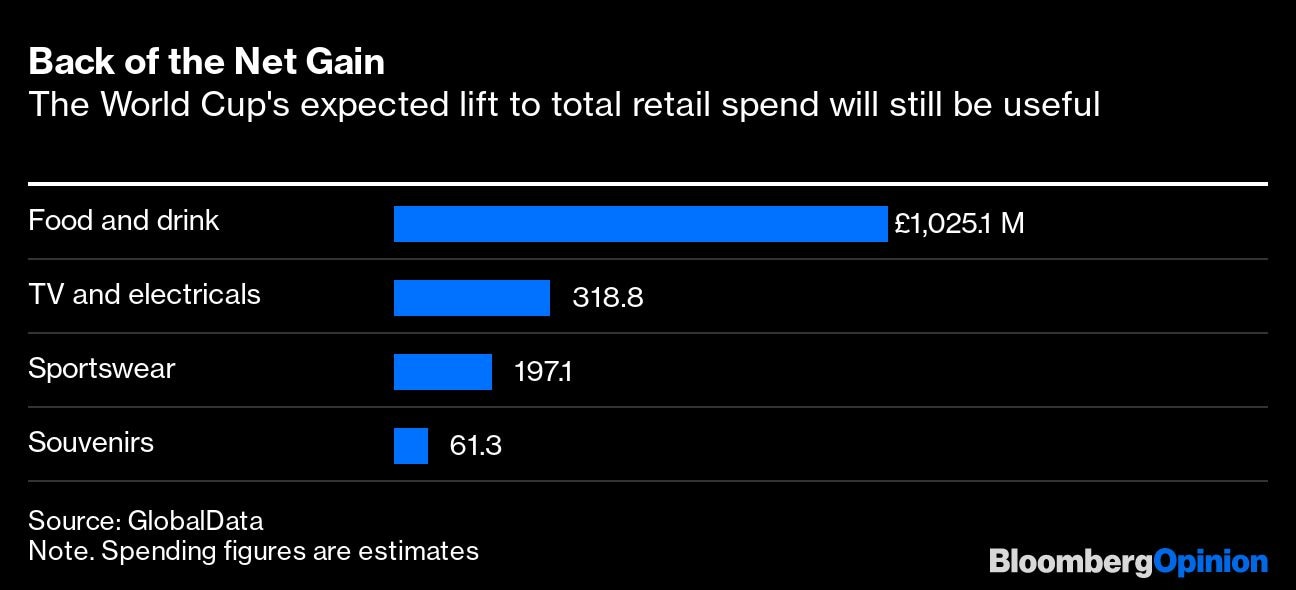The World Cup usually offers a big boost to the UK economy. With a bit of luck, the sun shines and England makes it a decent way through the tournament, encouraging people to flock to pubs and host viewing parties at home. But even before the first kickoff this year, one of those ingredients will be missing.

The competition, which starts on Sunday, will be the first to take place in the British autumn. Up until now, it has occurred in warmer months, automatically ratcheting up the feel-good factor and the money flowing through the till. The calendar, and the controversies surrounding the Qatar games, explain why the 2022 event may be a more muted affair for retail and hospitality businesses.
Given the shorter days and colder temperatures, fans will primarily have to watch matches indoors. That will limit the number of people that pubs can serve, note analysts at Shore Capital. Even many of those watching at home will probably have fewer guests than they might in the summer, when they can use their balconies and back gardens.
Some pubs may be able to repurpose the Covid-era facilities they invested in to allow people to drink and dine outdoors. This will benefit the strongest operators, such as Young & Co.’s Brewery Plc, which has over 100 pubs with tents and outside heaters, and Fuller Smith & Turner Plc, where 70% of the estate has external space that can be used to show games. Plus, they won’t have to deal with social distancing.
The tournament also comes amid the cost-of-living crisis, which may take away some of the exuberance too.
Consequently, research by GlobalData for VoucherCodes estimates that retail spending will be 19% lower than the 2018 World Cup and 41% less than the UEFA European Football Championship held in 2021. Hospitality spend will be 10% below 2018 and less than half of 2021.
Electronics retailer Currys Plc has a range of promotions to boost TV sales, but the economic backdrop may diminish demand for expensive gadgets. England vs. the US on Nov. 25 at 7 p.m., while more promising for pubs, also falls on Black Friday, so it’s not clear what impact this will have on what would usually be a big online shopping day. Many retailers have brought forward their Black Friday promotions.
That said, the World Cup does offer the opportunity of some extra sales for supermarkets and hospitality companies.
Alongside the weather, the other big determinant of how much people will spend is England’s performance. The 2018 World Cup was blessed with both ingredients: Not only did it coincide with a heatwave, but England made it to the semi-finals. And victory in the UEFA Women’s Euro 2022 came amid a long hot summer. Even with more seasonable temperatures a year earlier, England reaching the finals of the Euros boosted sales. So far, this autumn has been warm, which may lift the spirits.
If the stars align and England or Wales — neither Scotland nor Northern Ireland qualified — do progress, matches could be combined with festive get-togethers to lift trade.
Supermarkets could see a strong run from Halloween through the Christmas holiday. While football fans may be buying less fresh food, such as higher-margin barbecue meats and salads, they will be stocking up on other snacks, such as pizzas, party food and dine-in deals. And booze is a perennial seller.
As for pubs, they could enjoy a boost to sales from late November. This typically quiet time may see more business, particularly on Mondays and Tuesdays when some of the early England and Wales games take place. That could segue nicely into Christmas trade, already set to be bolstered by a return of office parties. Youngs estimates that bookings for England and Wales’ group stage matches could generate about £400,000 ($474,360) in sales. Spur-of-the-moment visits should increase revenue further.
Of course there will be other challenges. The final will be on Sunday Dec. 18, so the latter stages of the tournament could conflict with Christmas dinner reservations. Restaurants and pubs may have to grapple with satisfying both fans and families alike. Meanwhile, the grocers would have to withstand the twin demands of Christmas trading and football, something that Tesco Plc Chief Executive Officer Ken Murphy has described as a “bit of a curveball.”
England’s performance and the British weather have something else in common: There is always plenty of scope for disappointment. But with the full force of the cost-of-living crisis yet to be unleashed, retailers and hospitality venues will be clutching at any crumbs of comfort.
More From Bloomberg Opinion:
• Burberry Is On Its Way to Luxury Powerhouse Status: Andrea Felsted
• UK Housing Market Is Getting Desperate Once Again: Merryn Somerset Webb
• British Families Are Already Being Hit by Stealth Taxes: Stuart Trow
This column does not necessarily reflect the opinion of the editorial board or Bloomberg LP and its owners.
Andrea Felsted is a Bloomberg Opinion columnist covering consumer goods and the retail industry. Previously, she was a reporter for the Financial Times.
More stories like this are available on bloomberg.com/opinion
This Link is Source Fromnews.google.com



